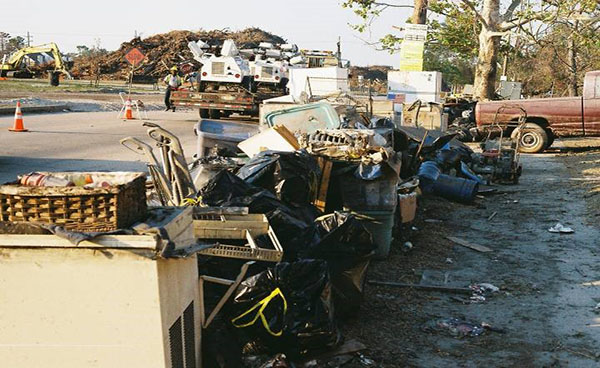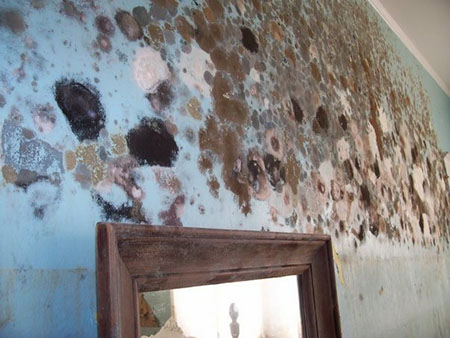
“Contents of our home piled up in the front yard. Piles of such debris were segregated by hazardous contents, and collected in the medians daily by the Army Corps of Engineers, the National Guard, and FEMA.”
Editors’ Note: In light of the devastation caused by Hurricane Harvey, we asked fourth-year medical student Elizabeth Dupont to reflect on her experiences as a survivor of Hurricane Katrina and offer her thoughts about what those who have lived through catastrophic events need.
Twelve years ago, my New Orleans home was under 10 feet of water. A brackish lake sat in our living room for three weeks, inviting biodiversity interesting enough to attract mycologists to study our walls. It was the beginning of a four-year rebuilding process—and a lifetime of physical and mental recovery for the entire region. As Hurricane Harvey resurrects the trauma of Katrina, I find myself wanting to do something. I know you do, too, as do many others.
Hurricane Harvey and Hurricane Katrina have displaced different populations and flooded different topographies. But large-scale, sudden loss brings with it certain lessons about how to help in a way that is most effective for the thousands of people in need.
Hurricane Katrina hit during my first week of college. My mom was helping me move in and couldn’t go home to New Orleans because the contraflow protocol blocked traffic going back into the city. She spent my first night of college with me in my dorm room. My sister evacuated with family friends to Mississippi, though for weeks we didn’t know where she was. Thousands didn’t have access to phones or the Internet or local banks.
A New and Unwanted Status

House in the author’s neighborhood after Katrina
We were refugees—internally displaced persons—and homeless. These were uncomfortable terms to accept; new identities had been thrust upon us without our consent. I had never before used food stamps or lived in shared housing with another family. In my mind, such resources were meant for those in “real need.” It was difficult to acknowledge our new state of vulnerability.
For us, it was a time of grief and loss; it seemed as if everything was gone.
We learned to triage our anxieties, but they took a toll. As pre-Katrina Americans, we were used to an infrastructure that was now destroyed. How can you function following such loss? How do you get access to cash and communications? Where will you live? How can you work? Where will the kids go to school? Even after the water receded, questions flooded our minds. For those stuck on rooftops and in trees for days, for those who lost loved ones, layers of trauma compounded the physical loss.
After Katrina, there was no choice but to wait in line with thousands of others for government assistance, completing mountains of paperwork and hoping that some of it would result in cash so we could eat, find a place to live, start over. It’s impossible to survive recovery on your own. Any bootstraps we had were washed away.
We became dependent upon the hard work, good motivations and mercy of others. We relied on other people to care, to support votes in Congress for appropriations and to offer donations for our survival as we sifted through the wreckage.
Compounding the tragedy for many of those in the path of Harvey: This is their second hit by a historic storm, because many of those displaced by Katrina had moved to the Texas coast.
For those new to such strains, they need to know this: they’re going to make it. Things will be different, but they will be okay despite the next weeks, months and years of anxiety, paperwork and manual labor.
The physical demands are hazardous. Removing debris, gutting mold-infested homes and rebuilding are backbreaking, infectious jobs. I remember working with a neighbor to dig trenches under the foundation of our house to expose the plumbing. We needed to know what we were dealing with for reconstruction. It seemed logical at the time—but was it really safe? There were not enough experts available to consult. We just had to make decisions to get through the day—to move forward toward the time when it would “just be over.”
New Medical Challenges

Mold damage from Hurricane Katrina – Photo by author
Those of us looking to help need to ensure that the public health and medical infrastructure is ready to prevent and address ailments arising from increased stresses and a new level of risk-taking.
If you’re a medical professional, ask colleagues in the region how you can help. If you are a mental health professional, your work will be critical for years to come.
In affected areas, healthcare workers are in high demand, often while managing devastation in their own lives. They will need support and backup. Licensed professionals can volunteer for nine-day deployments with the Red Cross, which also has experience with cross-state and international licensing. The good news: Highly skilled volunteers from the Mexican Red Cross are already on their way!
I am aware of specific requests for:
- Behavioral therapists
- Social workers
- Psychologists
- Nurses
- Family doctors
- Grief counselors
Meeting Immediate Needs
In the aftermath of Katrina, masses of well-intentioned, unskilled hands arrived for short relief trips, delivering a profound sense of solidarity. But what the people of Texas and Louisiana need most today are funds and resources to allow skilled first responders to save lives.
Right now, financial donations are how they are going to make it through some of the worst days of their lives. In a few weeks, we will need to listen to local assessments of the damage and respond to regional requests.
There are many organizations ready to help. You are not going to find the “perfect” one, but you can find a good list of organizations to contribute to at www.texasmonthly.com.
The Red Cross was in New Orleans at a comparable point after Katrina. It offered us daily food, psychological support, connections to resources such as tetanus and hepatitis A vaccinations and cash for our immediate needs. As a large organization it has the flexibility to adjust its responses to the needs of the day and the scope to reach affected areas in Texas and Louisiana (beyond Houston) for years to come.
Long-Term Care
We need to keep caring. Eventually the storm—and the news coverage—will die down. It will be easier to forget distant struggles. Reach out to recovery organizations, offer your skills and send out your resume in an email that says, “How can I help?” Commit to one day or one week every year when you contribute your time to the recovery process. Put it on your calendar. For the next ten years. I’m serious!
It took a decade for us to go to the neighborhood grocery store without talking construction, tracking displacements and tempering PTSD. In a post-Katrina world, there was never enough psychological support. Anything you contribute will have meaning, but there are some high-yield ways to help.
Survival and recovery can be dehumanizing endeavors. During my first semester in college, I made a friend: Ray Fidel Skidmore, from Florence, TX. He was a freshman who always tucked in his shirt and frequently wore a cowboy hat—an astute country boy whom his “momma raised right.” He asked me how my family was. He listened. And for the next four years he organized teams of students to go to New Orleans. My mom and I would make jambalaya and give PowerPoint presentations about “the storm.” Ray brought tamales, guided teams that helped our city move forward through the wreckage and made us feel like unforgotten neighbors. Texans delivered solidarity in the wake of Katrina, and now it’s time for us to do the same.
If you meet people from a hard-hit area, ask if they were affected by Harvey and if their families are okay. It is okay if the interactions are awkward. No one knows what to say. What is important is that those affected know they are not alone. Listen and ask questions. Maybe buy them some coffee. This exchange is less common and more meaningful than you can imagine.
A Couch to Share?
Air BNB is helping provide temporary housing. This is especially critical for the elderly, the medically vulnerable and those with chronic conditions who require immediate attention outside the affected area.
Want to Send Stuff?
People in shelters (e.g., the George R. Brown Convention Center) will get sick in the days and weeks to come. Basic supplies can help prevent the spread of disease. Material requests from the convention center include:
- Wheelchairs
- Diapers
- Baby bottles
- Baby formula
- Blankets
- Towels
- Travel-size shampoo, soap and deodorant
- Individually wrapped food packs (e.g., MREs)
- Distractions for kids (e.g., coloring books, crayons, puzzles)
Check online before sending anything to ascertain the requirements and also to find out the addresses where goods should be sent.
The best things medical students can do now are to raise money and to pay attention to needs as they arise.
The bottom line: Get involved. It will make a difference.
You are welcome to write me to get involved in relief efforts through Einstein: elizabeth.dupont@med.einstein.yu.edu.

